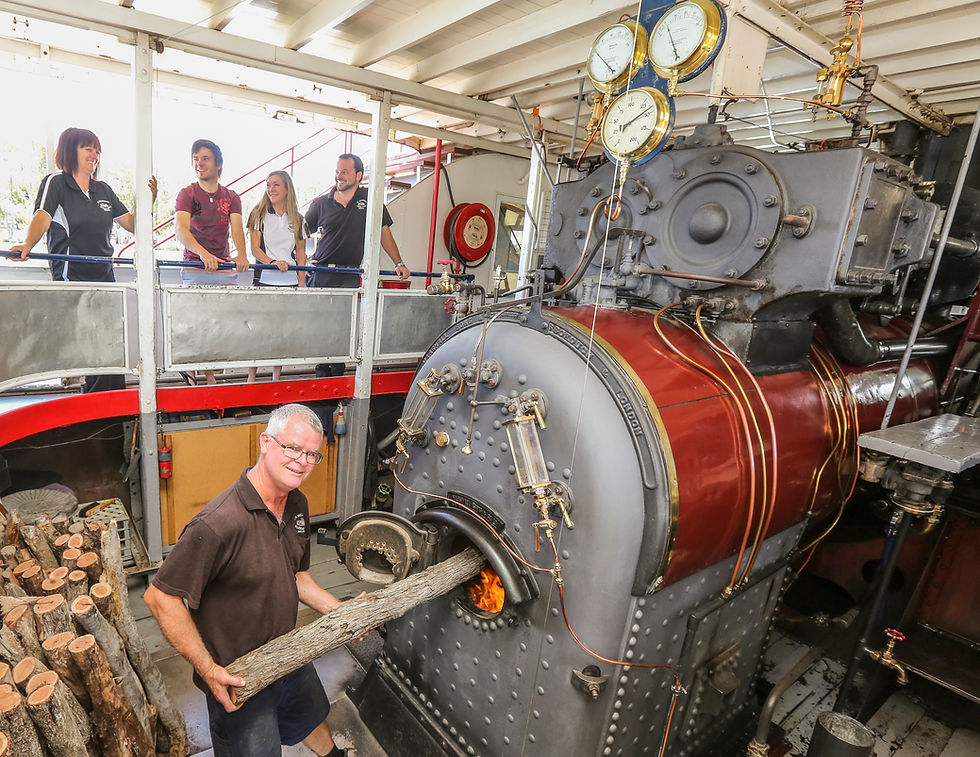Paddle Steamer Melbourne Annual Boiler Survey 2019
- Ashton
- Aug 3, 2019
- 4 min read
Each year the Paddle Steamer Melbourne has her boiler and engine surveyed and assessed for safety and function. During this time, it is slowly cooled down, cleaned, pulled apart, inspected, routine maintenance is carried out, or any major maintenance if any issues are found. A qualified inspector then comes and assesses the integrity of the boiler and engine, certifying it for operation. Once assessed, any issues found are repaired, everything is put back together and checked. The fire is then re-lit in her fire box, as she is gradually warmed back up to temperature, then her pressure is slowly brought up. Below is a basic outline of the processes the engineers go through to get her ready for this Annual Boiler Survey.
The first step, in preparing for survey, is to slowly let the engine pressure lower, and slowly cool it down, until the fire is out. This process usually takes about 2 days. Next comes the fun part, of finding the dirtiest clothes you can find in the cupboard, as this is what we like to call, the "dirty day" which then is followed by the "wet day". What that means, is that all the ash, soot, dirt and grime, from a year of operation, is cleaned out of the smoke box, fire box and tubes (dirty day) - then it is all hosed out (wet day). It is done this way, as it is the most efficient way of doing things - otherwise you will have a wet day followed by a muddy day!
We start at the Smoke Box end, cleaning out the funnel, opening the smoke box door and cleaning the tube ends, getting rid of the dust and dirt. We remove the plug at the bottom of the tubes, ready to flush it all out on wet day. We use brooms, wire brushes and a vacuum cleaner, to remove as much as we possibly can, before moving to the other end of the boiler.
The other end of the boiler, is called the "Fire Box" - because that is where the fire is! (How original!) The jobs are similar up this end, with the tubes being cleaned out, and all the crowned stay nuts being cleaned with a wire brush. Anything more stubborn, requires more elbow grease and scraping, but as that is done annually, it is generally pretty easy to clean out. Within the Fire box, are "Fire bars", which are bars that the fire sits on, that acts like a grill, where the ash can fall through beneath, to be cleaned out. There are two sets of Fire bars, front and back. These are removed during this process, and individually cleaned and inspected. We then have greater access within the fire box to resume cleaning and vacuuming it out. We also pull out the plug, ready for flushing it through on wet day.
This then brings us to "wet day", where everything is hosed out, from one end to the other. Mud Plugs have been removed at the sides of the engine, and everything is given a good flush, until clear water is coming through, a sign that it is clear of dirt, dust, mud and grime. Every plug that gets removed will get a new seal put onto it - this occurs every year. The gauges get pulled apart and inspected. The gauge cases are made from bullet proof glass, as a safety measure in case the live boiler pressure gauge glass shatters. The rubber seals and washers on these get replaced annually, regardless of condition. The pressure release valves are taken apart, cleaned and inspected.
The feed water pump, steam injector and check valves are next. Everything here gets pulled apart, cleaned out and inspected. We always need to ensure things go back in the exact same way.
The inspector then comes down to the vessel, meeting with the Directors and steam engineer. They go through the engine and boiler, with a "fine tooth comb" so to speak, looking for any abnormalities, areas of weakness, deficiencies, safety concerns, etc. The inspector was REALLY happy with how clean the boiler of the Paddle Steamer Melbourne is and has given her a clean bill of health! Otherwise known, as certification to operate.
The next steps, are pretty much the reverse of everything done previously. Everything gets put back together. New pressure gauge glasses are installed, plugs with new seals get replaced, fire bars are put back into the fire box, and the boiler gets filled up with water.
A warming fire is then lit within the fire box, and the boiler is slowly warmed up. The focus is then on slowly building up the steam pressure. As this is occurring, final checks are being made throughout, including tightening of the plugs as it warms, assessing everything is working properly and as it should. The brass fittings are all cleaned, the engine room floor has been painted, wood has been loaded and stacked, ready for operation.
Notes are taken and recorded within the Engines log book, as to what maintenance has been undertaken, what things have been done to the engine, and what is not needed yet, but is to be looked at next time. During this particular annual boiler survey, no big maintenance jobs or changes were carried out, as everything was "ship shape"!
The Paddle Steamer Melbourne will be commencing her regular cruise schedule, tomorrow, August 4th 2019. Her cruise departs the Mildura Wharf at either 10.50am or 1.50pm and goes downstream through Lock 11. Come on down and check out her engine - it is a piece of machinery to marvel at, immaculate and mesmerising to see in action!




























Comentarios